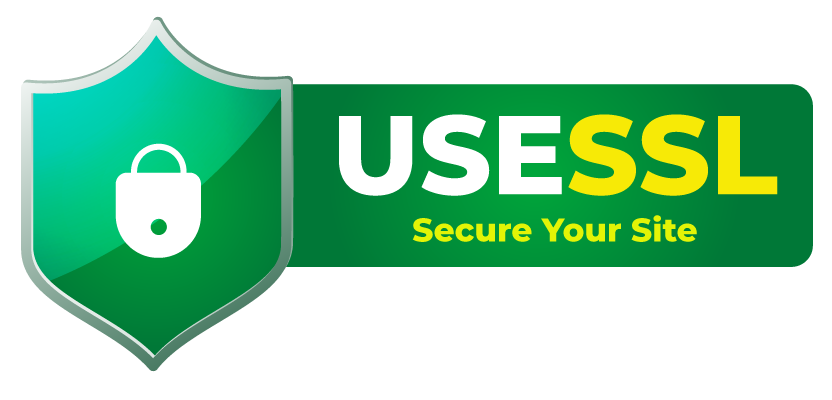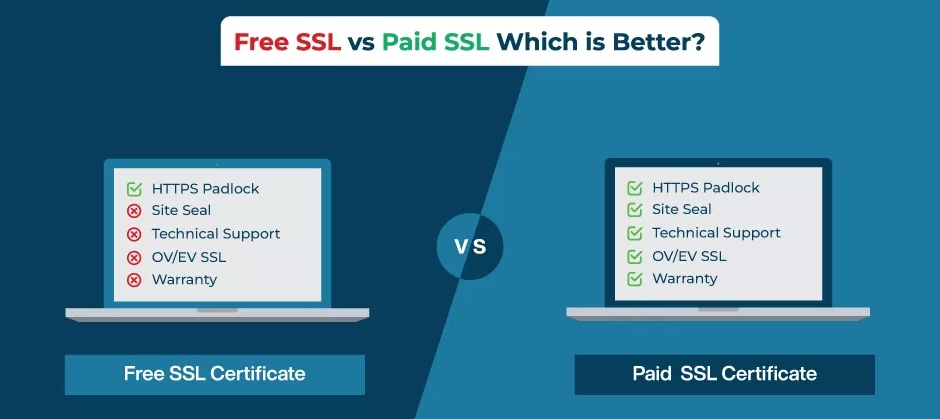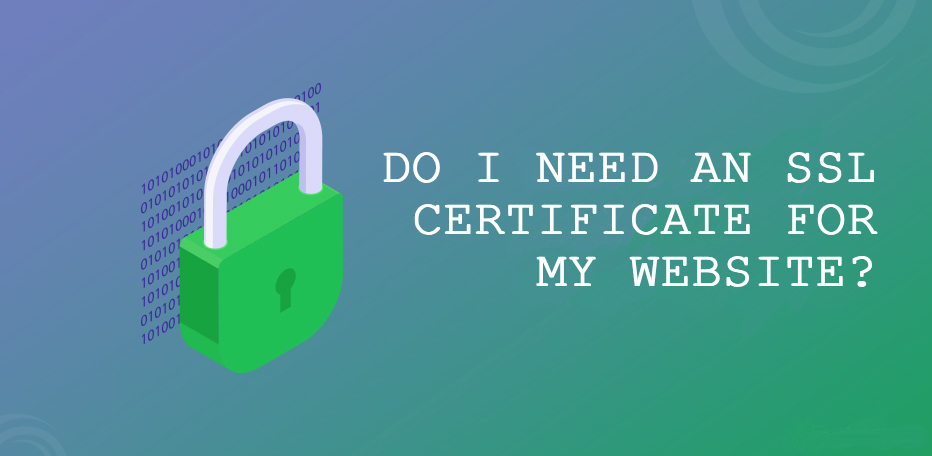When it comes to securing your website with SSL (Secure Sockets Layer) certificates, you can choose between free SSL certificates and paid SSL certificates. Both serve the same basic purpose of encrypting data between the server and the client (i.e., your website and the user’s browser), but there are differences in features, trust levels, and use cases.
Free SSL Certificate
A free SSL certificate provides basic encryption and is often suitable for personal websites, blogs, and small businesses.
Pros:
- Cost-Effective: As the name suggests, they are free to obtain, making them perfect for those on a budget or for smaller websites that don’t need advanced features.
- Easy to Install: Free certificates, especially those from services like Let’s Encrypt, can be installed quickly and with minimal technical know-how, especially with hosting platforms that integrate it automatically.
- Basic Encryption: Free SSL certificates offer the same encryption level (typically 128-bit or 256-bit) as paid certificates, so they still provide strong security for website visitors.
- Automatic Renewal: Some free certificates, like those from Let’s Encrypt, automatically renew every 90 days, which reduces manual work for the site owner.
Cons:
- Limited Support: Free SSL certificates typically don’t come with customer support. If something goes wrong, you’ll need to troubleshoot on your own or rely on online forums and documentation.
- No Warranty: Paid certificates often come with a warranty, meaning if there’s a breach or something goes wrong, the certificate authority (CA) could cover damages. Free SSL certificates generally don’t offer this level of security.
- Shorter Validity Period: Free SSL certificates are often valid for a shorter period (usually 90 days with Let’s Encrypt) and require more frequent renewals. While some hosts automate this, it can be a hassle for others.
- No Extended Validation (EV): Free SSL certificates usually only offer Domain Validation (DV), which checks if you own the domain but doesn’t offer higher levels of validation. As a result, they may not display the green address bar or company name in the browser.
- Perception Issues: While this is less of an issue now, some users may not trust free SSL certificates as much as paid ones, especially on business or e-commerce sites.
Examples of Free SSL Providers:
- Let’s Encrypt: A free, automated, and open certificate authority that provides DV SSL certificates.
- Cloudflare: Offers a free SSL certificate for users who use their CDN and security services.
Paid SSL Certificate
Paid SSL certificates are issued by Certificate Authorities (CAs) and come with additional features and benefits.
Pros:
- Enhanced Security Features: Paid SSL certificates often offer additional security features like Extended Validation (EV), Organization Validation (OV), and Wildcard certificates (which cover multiple subdomains). EV certificates, for example, display the company name in the browser address bar and offer more trust signals to users.
- Customer Support: Paid certificates typically come with professional customer support, which is useful if you run into installation or technical issues.
- Warranty Protection: Some paid certificates come with a warranty (e.g., $1 million) that covers losses in the event of a security breach due to a flaw in the SSL certificate.
- Longer Validity Period: Paid SSL certificates are often valid for 1-2 years (or more), reducing the frequency of renewals and making it easier to manage.
- Better Trust: Paid certificates, especially EV SSL certificates, offer greater trust and credibility to users because the verification process involves checking the legitimacy of your organization or business, not just domain ownership.
- Compatibility: Paid SSL certificates may offer broader compatibility with different devices and browsers, which can be important for businesses with a global audience.
- Wildcard and Multi-Domain Options: Paid SSL providers often offer Wildcard SSL certificates (covering all subdomains) or Multi-Domain (SAN) SSL certificates (covering multiple domains), which are more flexible for larger websites or businesses with complex needs.
Cons:
- Cost: Paid SSL certificates come with a cost, ranging from $10 to hundreds of dollars per year, depending on the type and provider.
- More Complex Installation: While the installation process is generally straightforward, some certificates (especially EV or OV) may require additional documentation, verification, or steps, which can make them more complicated to install than free certificates.
- Renewal Fees: You must pay for renewal every year (or a multi-year term), which can add up over time, especially for large websites requiring multiple certificates.
Examples of Paid SSL Providers:
- DigiCert, Symantec, GlobalSign, Sectigo, Comodo, GeoTrust: These are all well-known certificate authorities that offer different types of paid SSL certificates, including EV, OV, Wildcard, and Multi-Domain SSL.
Comparison Table: Free vs. Paid SSL Certificate
| Feature | Free SSL Certificate | Paid SSL Certificate |
|---|---|---|
| Cost | Free | Starts around $10/year, can go much higher |
| Support | No official support | 24/7 support from the provider |
| Validation Level | Domain Validation (DV) | Domain, Organization, or Extended Validation (EV) |
| Encryption Strength | Same as paid (128-bit or 256-bit) | Same as free (128-bit or 256-bit) |
| Warranty | None | Includes warranty (up to $1M coverage) |
| Validity Period | 90 days (automatic renewal for some) | 1-2 years or more |
| Browser Trust Indicators | No EV or company name display | EV certificates display company name in the browser bar |
| Wildcard/Multi-Domain Support | Limited | Available (e.g., Wildcard or SAN SSL) |
| Use Case | Small websites, personal blogs, testing | E-commerce, businesses, large-scale sites |
| Installation Complexity | Simple, automated for most hosting | Can be more complex, especially for EV/OV |
When should you choose a free vs. paid SSL certificate?
Choose a free SSL certificate if:
- You’re running a small personal website, blog, or portfolio.
- You’re just testing or experimenting with SSL encryption.
- Your website doesn’t process sensitive data or transactions (e.g., no e-commerce or login features).
- You’re working with a tight budget and need to quickly secure your site.
Choose a paid SSL certificate if:
- You run an online store, e-commerce site, or any business that collects personal information, financial details, or sensitive data from customers.
- You want to build trust and credibility with your customers through advanced features like EV or OV validation.
- You need support, warranty protection, or advanced security features like Wildcard or Multi-Domain SSL certificates.
- Your website handles significant traffic and requires higher levels of compatibility and trust.
In conclusion, free SSL certificates are great for basic encryption and small-scale use, while paid SSL certificates offer more features, better support, and enhanced trust — making them essential for businesses, e-commerce sites, and any website handling sensitive data.



Write a comment
Your email address will not be published. All fields are required